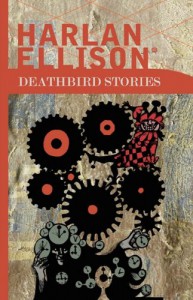 I didn't know quite what to expect from this volume, especially after reading the author's caveat at the beginning:
I didn't know quite what to expect from this volume, especially after reading the author's caveat at the beginning:It is suggested that the reader not attempt to read this book at one sitting. The emotional content of these stories, taken without break, may be extremely upsetting. This note is intended most sincerely, and not as hyperbole.
Not that this is an issue for me, I never read books in one sitting. But after finishing these stories I can see what the author means and agree that it is not (at least entirely) hyperbole. Most of these stories are pretty bleak, full of deeply unlikable characters showing humanity's worst side.
This is a themed collection, containing many stories previously printed in earlier collections (I skipped "Pretty Maggie Moneyeyes" and "Delusion for a Dragon Slayer" that I had already read in I Have No Mouth and I Must Scream). The stories all seem to feature death, belief and gods. They also resist categorisation but include elements of SF, fantasy and horror.
While some stories seemed to lack subtlety and felt heavy-handed ("The Face of Helene Bournouw" and "Paingod") others were the other extreme and too opaque ("Neon" and "At the Mouse Circus"). However, there were some real gems. Powerful emotional stories that will stay with you ("The Whimper of Whipped Dogs" and "Basilisk") and engaging stories with striking imagery ("Ernest and the Machine God", "Rock God" and "Adrift Just Off the Islets of Langerhans").
Ellison doesn't seem to do bland or just so stories. He strives for the full emotional effect each time and some might find it too harsh or upsetting but at least you will react and remember them.
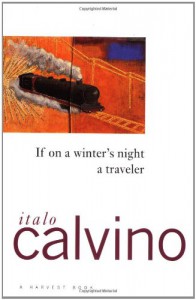 This is almost more of a philosophical treatise on reading and writing than it is a novel. The second person narrative is punctuated by fragments (beginnings) of books that the protagonist (you) read but for one reason or another, despite your frustrations, are perpetually unable to complete.
This is almost more of a philosophical treatise on reading and writing than it is a novel. The second person narrative is punctuated by fragments (beginnings) of books that the protagonist (you) read but for one reason or another, despite your frustrations, are perpetually unable to complete. At first the protagonist is more interested in getting to know a female acquaintance met in a bookshop who has started the same book, then you move onto the trail of the illusive and shady disseminator of forged translations on a mission of falsification but end up ruminating on the nature of literatue and trying to define what is that the act of reading is all about.
At first I found I was more interested in the main narrative thread in between the story fragments, later I began to be more entranced by the stories themselves. You may find yourself as frustrated as the protagonist is by the abrupt was in which each story fragment ends. Instead you must try to see them as part of a whole, try to glean the meta story.
At first I wasn't sure if this book was going to be for me but I ended up rather enjoying it although not sure I have fully grasped all that the author was trying to say. Definitely one that would benefit from a re-read at some point. And also an author that I will try read again one day.
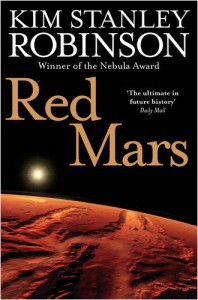 You need to know what you're getting into before you embark upon reading this novel. If you're in the mood for an in-depth and realistic chronicle of how humanity might go about the colonisation of Mars in the not to distant future, if you love hard science fiction, if seeing how huge technical problems are overcome with spectacular feats of engineering excites you, if a somewhat slow-paced and long-winded story doesn't bore you and a large cast of generally realistic but not particularly sympathetic characters don't turn you off, this is definitely the book for you.
You need to know what you're getting into before you embark upon reading this novel. If you're in the mood for an in-depth and realistic chronicle of how humanity might go about the colonisation of Mars in the not to distant future, if you love hard science fiction, if seeing how huge technical problems are overcome with spectacular feats of engineering excites you, if a somewhat slow-paced and long-winded story doesn't bore you and a large cast of generally realistic but not particularly sympathetic characters don't turn you off, this is definitely the book for you.I had a fair idea what to expect before I picked this up and I was in the mood for it. Sending a carefully selected team of scientists on a colonisation mission reminded me of Poul Anderson's Tau Zero, being a chronicle of the colonisation of Mars reminded me of Ray Bradbury's The Martian Chronicles and a future history account of the an attempt to establish a new and utopian society reminded me of Isaac Asimov's The Foundation Trilogy but really this is like none of those. This feels much more modern applying the latest scientific ideas. One really gets a sense of the author's passion and detailed knowledge of Mars in this book. And so the story plays out a deeply convincing world which the author authoritatively creates for the reader.
Now I find myself contemplating whether to proceed onto the sequels. Not immediately, that's for sure. I need a break and am not used to reading books this long. But I would like to revisit Mars one day and find out what happens to colony's remnants, and what kind of world they can make for themselves.
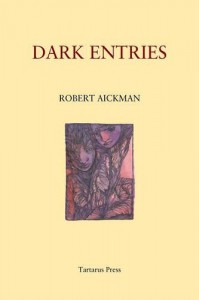 Normally when I review one of Robert Aickman's collections, I ramble on about his masterful craftmanship of strange tales, his lush and supple prose, talking much about the author's style in general. But I'm not going to do that this time. Let's face it, if you're thinking of picking this book up you are already a hardened fan. Unless you're extraordinarily lucky to discover this tucked away out the back of some dusty old second-hand store, you're paying a lot of money for one of these fine but expensive Tartarus Press editions.
Normally when I review one of Robert Aickman's collections, I ramble on about his masterful craftmanship of strange tales, his lush and supple prose, talking much about the author's style in general. But I'm not going to do that this time. Let's face it, if you're thinking of picking this book up you are already a hardened fan. Unless you're extraordinarily lucky to discover this tucked away out the back of some dusty old second-hand store, you're paying a lot of money for one of these fine but expensive Tartarus Press editions.This collection contains only six stories, one of which I've read before ("Bind Your Hair") and an introduction by Dr Glen Cavaliero. One reason I picked this up, other than getting hold of several stories not included in the relatively cheaper and more readily available collections, was to get to read the legendary "Ringing the Changes". I noticed that many Aickman fans had cited this as their favourite and after reading it I can see why. One of his more outright terrifying stories. I loved it.
But Aickman rarely writes stories that are conventional horror. Usually they are more strange, only hinting at something more horrific under the surface. "The School Friend" is like this. We experience the story through the eyes of a female protagonist who sees her old friend change inexplicably as she moves back into her family home. "Choice of Weapons" is completely outré as we follow a man who falls in love with a woman at first sight whilst on a date with another and then the consequences of his obsession unfold. "The Waiting Room" is the least interesting, still worth reading but definitely one of his minor stories.
Included in this edition, although not in the original edition, is "The View", which actually originally appeared in his first collection that he contributed to jointly with Elizabeth Jane Howard, We Are For The Dark. This version is one that Aickman had apparently slightly re-written. A great story though exploring the tension between the forces for change and stasis in Aickman's own oblique way.
All in all, another fine collection but then I am increasingly of the opinion that it would be extremely difficult to put a collection of stories by this author together and for it not to be outstanding.
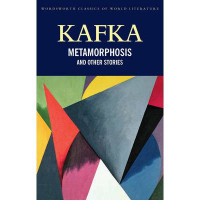 In reading this I have strayed quite far outside of my usual comfort zone. But what attracted me to Kafka is that he apparently wrote about the horror of the human condition and that his stories were are often quite surreal and weird. I found all this to be quite true.
In reading this I have strayed quite far outside of my usual comfort zone. But what attracted me to Kafka is that he apparently wrote about the horror of the human condition and that his stories were are often quite surreal and weird. I found all this to be quite true.It would seem that his stories are often metaphorically alluding to something else but I haven't felt compelled to dwell on that aspect too deeply, enjoying the stories for their strangeness and humour, their full meaning often alluding me.
I've no idea how he wrote his stories but some of them almost feel stream of consciousness style. The narrator will pursue one thought after another in a seemingly directionless fashion, taking unexpected turns and usually ending inconclusively.
I have enjoyed most of the stories here to greater or lesser degrees but none have particularly bowled be over in amazement. "The Stoker" was great as well as "The Penal Colony" but the story that came closest to blowing me away was "A Little Woman", a wonderful tale of obsession.
This book collects all the stories published during his lifetime and there's apparently another companion book released by Penguin that collects the others that were published posthumously. I may well pick it up one day.
 This is something that I only remember from the old tv series that used to be on when I was a child but I thought it might be a good book to read to my daughter. Which indeed it was.
This is something that I only remember from the old tv series that used to be on when I was a child but I thought it might be a good book to read to my daughter. Which indeed it was.It was more of a morality tale than I remember it being. If we only put our trust in God and prey every night, everything will come out good in the end, even if it doesn't seem to at first. And bad deeds will always come out in the wash, only leading to good outcomes for the victims in the end. All a bit simplistic to say the least, but it is a children's book.
Heidi herself is almost cloyingly sweet. Impossibly selfless and always determined to see the joyful side of life. Not like a real child of course, except for brief moments on good days!
Still, after reading this I feel an urge to spend a summer in the Swiss Alps wandering alpine meadows and collecting wild flowers so it must have had an effect on me.
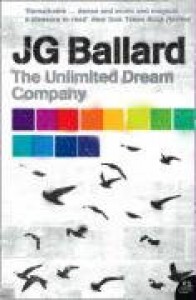 I picked this up on the basis of an unusual and interesting premise but until near the end I didn't know what to make of it. Full of Ballard's verbose and symbolic imagery, this story explores some very adult themes and is not for the easily offended. As the protagonist increasingly believes that the "sins of this world are metaphors for virtues in the next", he proceeds to break down taboos in the town of Shepperton as the reader is left to ponder the meaning of this idea.
I picked this up on the basis of an unusual and interesting premise but until near the end I didn't know what to make of it. Full of Ballard's verbose and symbolic imagery, this story explores some very adult themes and is not for the easily offended. As the protagonist increasingly believes that the "sins of this world are metaphors for virtues in the next", he proceeds to break down taboos in the town of Shepperton as the reader is left to ponder the meaning of this idea.As we follow Blake's transformation into some kind of messianic figure, biblical metaphors abound and the town of Shepperton becomes a kind of garden of Eden until realisation of his and humanity's ultimate destiny finally dawns on him.
My high rating of this book reflects more my intellectual appreciation of what the author was trying to do more than my emotional response and personal enjoyment which otherwise would have led me to rate this book lower. Take from that what you will.
The Fountains of Paradise
 This is a story of how a futuristic, modern wonder of the world came into being. Of how political, religious, technical and sometimes life threatening problems were overcome in order to make one man's dream happen.
This is a story of how a futuristic, modern wonder of the world came into being. Of how political, religious, technical and sometimes life threatening problems were overcome in order to make one man's dream happen.Arthur C. Clarke is a kind of luke warm author for me. I've never read anything of his that has set me on fire but I haven't hated anything either. This book is no exception. At times I felt quite engaged and at others I felt like I wish it would just get on with it.
I'm coming to the conclusion that I'm not particularly a fan of hard science fiction, particularly when the focus is on the application of new technology and the technical and engineering problems that need to be overcome. That's very much the focus in this book and, let's face it, Clarke's forte. One definitely feels when reading his work that he is quite knowledgeable on scientific and technical matters.
I can see why this book will (and does) appeal to others. I understand completely, it's just not really what I'm looking for in a book. But if you love imagining futuristic technology, impressive feats of engineering and thinking through technical problems and how they might be overcome, this book's for you.
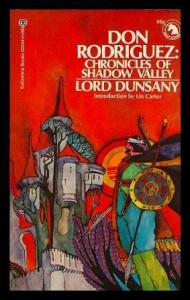 Well it would seem that the great Lord Dunsany was not infallible. I've loved every other book I've read by him and came to this one with accordingly high expectations and for the first time, he has not lived up to them.
Well it would seem that the great Lord Dunsany was not infallible. I've loved every other book I've read by him and came to this one with accordingly high expectations and for the first time, he has not lived up to them.In this story we follow Don Rodriquez after he inherits no more than a rapier and a mandolin from his lordly father and sets out on a quest to win himself a castle (with his rapier) and a lover (with his mandolin).
The problem for me was that the story just wasn't very interesting, the protagonist often impossibly dense and "surprise" plot developments not very surprising. All this probably wouldn't have mattered so much if I had found Dunsany's writing as engaging as I usually do but unfortunately it was not the case. Many of the passages I found long and laborious and frequently found my attention wandering. There were still flashes of Dunsany's brilliance, an occaisional turn of phrase that made me chuckle or left me in awe of its beauty.
Other quirky aspects were frequent, inexplicable and entirely unnecessary remarks of the narrator directed straight at the reader. Some of the dialogue of the characters left me feeling a little uncomfortable from a politically correct stand point (and believe me, I'm usually quite tolerant of this sort of thing in older authors).
Overall I would say that while this story still holds some of that Dunsany magic, I would not recommend it to anyone other than die-hard fans.
Celebration: Commemorating the 50th Anniversary of the British Science Fiction Association
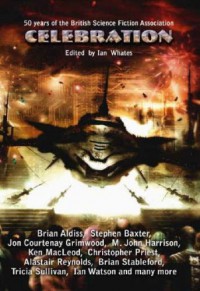 Another anthology of all new (at least they were all new when this was released three years ago), thematically unrelated stories, put together to celebrate the 50th anniversary of the British Science Fiction Association. As well as having no central theme, the stories contained here go beyond the bounds of SF to include fantasy as well.
Another anthology of all new (at least they were all new when this was released three years ago), thematically unrelated stories, put together to celebrate the 50th anniversary of the British Science Fiction Association. As well as having no central theme, the stories contained here go beyond the bounds of SF to include fantasy as well.Perhaps it's the celebratory nature of this anthology that it attracted some big names to write stories for it. No less than the likes of Brian Aldiss, Christopher Priest, M. John Harrison, Stephen Baxter and Alastair Reynolds to name but a few of them. And does the quality of the stories match our heightened expectations? Well, for the most part yes.
I really loved Ian Watson's "Having the Time of his Life", Brian Stableford's "Next to Godliness" and Martin Sketchley's "Deciduous Tree". These three were the highlights of the collection for me. Most of the other stories were also of a generally high standard. Inevitably a few fell a little flat; Ken MacLeod's "Wilson at Woking" and M. John Harrison's "Keep Smiling with Great Minutes", but I suspect this was more a case that they didn't particularly work for me rather than their being not very good stories. Some didn't feel particularly original but even in those cases they were entertaining enough.
So all in all a very good albeit eclectic collection of stories but not enough really cracking stories to make this a five-star rating.
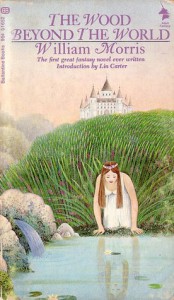 Although a continuous narrative, this was a book of three distinct phases for me.
Although a continuous narrative, this was a book of three distinct phases for me. Firstly was the set up, how Walter came to be in the "Woods beyond the World". During this part I was still getting use to the antiquated prose and narrative style, finding my rhythm while not much interesting happened plot wise.
Then I got to the central part of the story, in which Walter becomes embroiled in a strange love square. While Walter sits back and passively waits for events to unfold, the others conspire and plot against each other. For me, this was the most fascinating part of the story, in which I had found my stride with the prose and was enrapt by the characters and their machinations.
And then, when Walter and the maid flee and eventually make their way back to the "normal" world, the story began to peter out and my interest waned towards the end. I guess I was expecting more of an intricate plot and a twist in the tail of the story which did not happen.
As is so often the case, it comes down to one's expectations and how far they are exceeded or fallen short of. I picked up the book without particularly high expectations as I suspected that it might be overly antiquated and quaint but these expectations were surpassed by the middle of the book. Then, finding my self really enjoying the book, I felt somewhat let down by the end as the story failed, in my opinion, to realise its full potential.
Still, an interesting and enjoyable experience of one of the key novels that helped shape modern fantasy as we know it. A must read for a anyone interested in the origins of the genre.
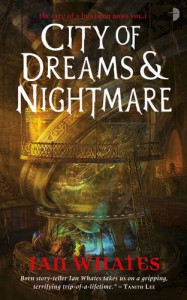 Only having read a short story by this author before, although several anthologies that he had edited, I was looking forward to reading a full novel by him. I wasn't really sure what to expect, least of which was I thought this was going to be SF but instead turned out to be some kind of urban fantasy thriller.
Only having read a short story by this author before, although several anthologies that he had edited, I was looking forward to reading a full novel by him. I wasn't really sure what to expect, least of which was I thought this was going to be SF but instead turned out to be some kind of urban fantasy thriller.The narrative started simply, the action kicked in right away and the story gradually grew in complexity as more characters were introduced, more layers of intrigue revealed.
In some ways, I couldn't help but draw parallels between this and Perdido Street Station, being another fantasy story set entirely within a single sprawling city with many dark and sinister corners hidden away. Physically though, this city is very different. A city of one hundred rows (or levels to be precise) and a similarly stratified society with the lower classes living near the bottom, the aristocrats living nearer the top. At the very bottom is the under city, a sprawling slum dominated by various gangs of "street-nicks" and awash with corruption. This is where most of the action takes place, at least in this volume. There is definitely a lot more about the real nature of the city that has been only hinted at here but we expect to learn more about in later volumes.
What let this story down for me slightly were a number of things that I just didn't find particular convincing. Knowledge just seemed to percolate far to quickly, the time period over which the under city degenerated too short. At the end, everything was just wrapped up a little too neatly, all the loose ends neatly tied up. The rogues were all too easily out maneuvered in the end that I couldn't help feeling that this was aimed at a young adult audience more than an adult.
Still, this was a good read, easy to get into and entertaining to the end. Ian has an easy and engaging writing style who doesn't get lost in needless exposition and over long descriptions. A good book but I'm just not quite sure I'm in the target audience.
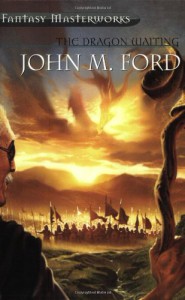 It's not often these days I have to put down a book unfinished and I don't like to, usually preferring to push on to the end to see if it can be redeemed. But this time it just seemed pointless, I really couldn't engage with the story and follow the intricacies of the plot.
It's not often these days I have to put down a book unfinished and I don't like to, usually preferring to push on to the end to see if it can be redeemed. But this time it just seemed pointless, I really couldn't engage with the story and follow the intricacies of the plot.I'm not quite sure what exactly about his writing style that makes it so hard for me to take it in. And you need to take it in because it's a complex story with constantly unfolding twists and turns to keep the reader on their toes. I think perhaps it was the way major plot developments or important facts were revealed as throw away lines at the end of descriptive paragraphs that I often found myself having to go back and re-read passages to make sure I had grasped all salient points in order to maintain my tenuous grasp of story.
It didn't help that the first hundred pages were like a prolonged, three-part prologue designed to introduce to the reader three of the main protagonists that were subsequently brought together. Themselves they were complex narratives with large casts of incidental characters that also introduced the reader to the complex political reality of Europe at the time (which is an altered version of Europe in the late twelfth century).
I just felt that I wasn't getting anything from the experience and was just wasting my time. It wasn't that the story was bad or boring, it was just that I couldn't follow it and life's too short.
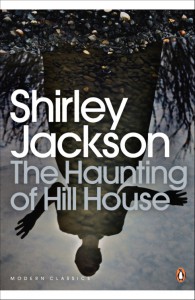 Reading this after having read Richard Matheson's Hell House, I knew it was going to be difficult not to draw comparisons and I hoped that this book wouldn't seem tame in comparison.
Reading this after having read Richard Matheson's Hell House, I knew it was going to be difficult not to draw comparisons and I hoped that this book wouldn't seem tame in comparison.Like "Hell House", this is a story of a group of disparate characters who arrange to stay in a supposedly haunted house so that the true nature of the phenomena can be studied and documented. The house itself has a long and mysterious past, is shunned by the locals and the guests are looked after by a strange local pair who refuse to be anywhere near the house any time after dark. As the house maid reliably informs them upon their arrival, if they scream in the night, no one will hear them.
In some ways this is tamer than "Hell House". It is far less overtly menacing, far less of a sense of physical danger is posed to the inhabitants. But in other ways, this house is every bit as scary. It is described so well, it's very nature invoking a strong sense of unease even before any form of manifestation occurs. The very dimensions of the house, every wall either being a few inches short of adequately roomy or a few inches too long to be adequately cosy, no vertex being a true right angle, leading to confusion in the characters' spacial awareness. It has many rooms arranged in concentric circles around the central room, most of which have no windows or if they do they do are covered with heavy drapes, the house is always dark and dingy, the doors between rooms always swinging shut adding to the confusion of the inhabitants.
Throughout the story there is an ambiguity as to what is going on, if the house itself a source of manifestations or a mere facilitator to the character's own imaginations and psychological hangups that they bring with them? The occurrences seem also the be strangely related to the relationships between the protagonists themselves, particularly Eleanor and Theodora.
This is a more intelligent and subtle handling of a haunted house story that leaves more room for ambiguity. Every bit as scary, albeit in a more restrained way, as Matheson's later treatment of the same subject matter.
 I've learned that when reading Wolfe, one should expect an oblique story, a narrative that makes little sense on the surface, who's meaning must be gleaned by penetrating the layers of the story, picking up on cryptic clues and piecing it altogether upon reflection after finishing the book. This is no exception.
I've learned that when reading Wolfe, one should expect an oblique story, a narrative that makes little sense on the surface, who's meaning must be gleaned by penetrating the layers of the story, picking up on cryptic clues and piecing it altogether upon reflection after finishing the book. This is no exception.One of the themes at the center of this story is identity. What it is that makes us different when we are physically the same and how can we tell the difference between the real thing and a clever simulation?
The narrative is split into three interconnected novellas and set on a colony world with a dystopian society and a mysterious, vanished alien aborigine. An anthropologist from earth arrives to investigate the true nature of this nebulous alien race. Sounds fairly conventional SF faire but stylistically this is anything but conventional.
As Adam Roberts points out in his introduction, there are parallels between this and Ray Bradbury's The Martian Chronicles but the comparison only goes so far, this is far more obscure. If you read this edition, I would strongly recommend reading the introduction after you have finished the book because it is spoiler laden beyond belief.
I generally like ambiguity and obliqueness in stories that leave you pondering it's implications afterwards but this is nearly too much for me. Perhaps Wolfe is just too clever for me? Or maybe I just need to read it a couple more times.
Slaughterhouse Five or, The Children's Crusade
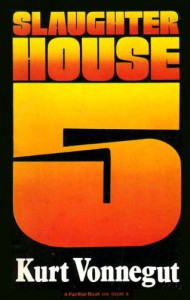 Some books you just know are five stars when you finish them. They leave you feeling slightly dazed, awe-struck and your head is buzzing with thoughts as you begin to process the implications of what you have just read. This describes exactly the way I felt when I finished this book.
Some books you just know are five stars when you finish them. They leave you feeling slightly dazed, awe-struck and your head is buzzing with thoughts as you begin to process the implications of what you have just read. This describes exactly the way I felt when I finished this book.The story is about the absurdity of life and man's inhumanity to man, framed by the narrative of the time travelling protagonist Billy Pilgrim but refrains from being overly depressing by being offset by Vonnegut's astute and wry humour.
Billy does not travel through time in the conventional sense, only his awareness moves through different stages of his life, seemingly at random, yet he is convinced of his powerlessness to effect or change the course of events in his life. He cruises through a life doomed to experience many tragic events and despite having little will to survive, seems to somehow avoid death. He is apathetic in the extreme, accepting the good and the bad with equal ambivalence.
The story is steeped in irony. In Vonnegut's universe, one finds it everywhere one looks. For example, the title of the book is the place where Billy and his fellow prisoners of war shelter from the Dresden fire storm, a disused abattoir, in which they manage to avoid the death that most of the other inhabitants of Dresden, hiding elsewhere, suffer.
One can talk about this book freely without fear of spoilers. The fragmented style of the narrative works well here because it is not only the reader that flashes back to past events, we experience his past precisely as the protagonist does. There are no big surprises in store for Billy or the reader because he's already experienced it all and we join the narrative at a point near the end of his life.
I can't say much more other than that this is a great book that I would recommend to all. I'll just leave you with a quote from the book:
"God grant me the serenity to accept the things I cannot change, courage to change the things I can, and wisdom to always tell the difference."



